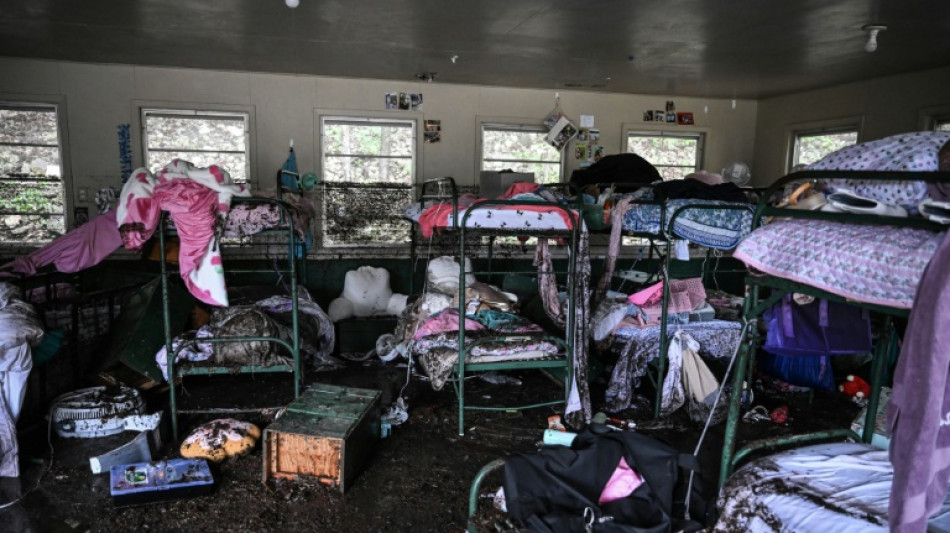
-
 Heart attack ends iconic French prop Atonio's career
Heart attack ends iconic French prop Atonio's career
-
SKorean chip giant SK hynix posts record operating profit for 2025

-
 Greenland's elite dogsled unit patrols desolate, icy Arctic
Greenland's elite dogsled unit patrols desolate, icy Arctic
-
Dutch tech giant ASML posts bumper profits, cuts jobs

-
 Musetti rues 'really painful' retirement after schooling Djokovic
Musetti rues 'really painful' retirement after schooling Djokovic
-
Russian volcano puts on display in latest eruption

-
 Thailand uses contraceptive vaccine to limit wild elephant births
Thailand uses contraceptive vaccine to limit wild elephant births
-
Djokovic gets lucky to join Pegula, Rybakina in Melbourne semi-finals

-
 Trump says to 'de-escalate' Minneapolis, as aide questions agents' 'protocol'
Trump says to 'de-escalate' Minneapolis, as aide questions agents' 'protocol'
-
'Extremely lucky' Djokovic into Melbourne semi-finals as Musetti retires

-
 'Animals in a zoo': Players back Gauff call for more privacy
'Animals in a zoo': Players back Gauff call for more privacy
-
Starmer heads to China to defend 'pragmatic' partnership

-
 Uganda's Quidditch players with global dreams
Uganda's Quidditch players with global dreams
-
'Hard to survive': Kyiv's elderly shiver after Russian attacks on power and heat

-
 South Korea's ex-first lady jailed for 20 months for taking bribes
South Korea's ex-first lady jailed for 20 months for taking bribes
-
Polish migrants return home to a changed country

-
 Dutch tech giant ASML posts bumper profits, eyes bright AI future
Dutch tech giant ASML posts bumper profits, eyes bright AI future
-
South Korea's ex-first lady jailed for 20 months for corruption

-
 Minnesota congresswoman unbowed after attacked with liquid
Minnesota congresswoman unbowed after attacked with liquid
-
Backlash as Australia kills dingoes after backpacker death

-
 Brazil declares acai a national fruit to ward off 'biopiracy'
Brazil declares acai a national fruit to ward off 'biopiracy'
-
Anisimova 'loses her mind' after Melbourne quarter-final exit

-
 Home hope Goggia on medal mission at Milan-Cortina Winter Olympics
Home hope Goggia on medal mission at Milan-Cortina Winter Olympics
-
Omar attacked in Minneapolis after Trump vows to 'de-escalate'

-
 Pistons escape Nuggets rally, Thunder roll Pelicans
Pistons escape Nuggets rally, Thunder roll Pelicans
-
Dominant Pegula sets up Australian Open semi-final against Rybakina

-
 'Animals in a zoo': Swiatek backs Gauff call for more privacy
'Animals in a zoo': Swiatek backs Gauff call for more privacy
-
Japan PM's tax giveaway roils markets and worries voters

-
 Amid Ukraine war fallout, fearful Chechen women seek escape route
Amid Ukraine war fallout, fearful Chechen women seek escape route
-
Rybakina surges into Melbourne semis as Djokovic takes centre stage

-
 Dollar struggles to recover from losses after Trump comments
Dollar struggles to recover from losses after Trump comments
-
Greenland blues to Delhi red carpet: EU finds solace in India

-
 Will the EU ban social media for children in 2026?
Will the EU ban social media for children in 2026?
-
Netherlands faces 'test case' climate verdict over Caribbean island

-
 Rybakina stuns Swiatek to reach Australian Open semi-finals
Rybakina stuns Swiatek to reach Australian Open semi-finals
-
US ouster of Maduro nightmare scenario for Kim: N. Korean ex-diplomat

-
 Svitolina credits mental health break for reaching Melbourne semis
Svitolina credits mental health break for reaching Melbourne semis
-
Japan's Olympic ice icons inspire new skating generation

-
 Safe nowhere: massacre at Mexico football field sows despair
Safe nowhere: massacre at Mexico football field sows despair
-
North Korea to soon unveil 'next-stage' nuclear plans, Kim says

-
 French ex-senator found guilty of drugging lawmaker
French ex-senator found guilty of drugging lawmaker
-
US Fed set to pause rate cuts as it defies Trump pressure

-
 Sleeping with one eye open: Venezuelans reel from US strikes
Sleeping with one eye open: Venezuelans reel from US strikes
-
Venezuela's acting president says US unfreezing sanctioned funds

-
 KPop Demon Hunters star to open Women's Asian Cup
KPop Demon Hunters star to open Women's Asian Cup
-
Trump warns of 'bad things' if Republicans lose midterms

-
 Russian strikes in Ukraine kill 12, target passenger train
Russian strikes in Ukraine kill 12, target passenger train
-
With Maduro gone, Venezuelan opposition figure gets back to work

-
 Celebrities call for action against US immigration raids
Celebrities call for action against US immigration raids
-
Rubio to warn Venezuela leader of Maduro's fate if defiant


Texas floods: How geography, climate and policy failures collided
"There's no such thing as a natural disaster," geographers like to say -- a reminder that human choices turn hazards into tragedies.
The Texas flash floods this weekend that left scores dead, including many children, offer a stark illustration.
Here is a look at the intertwined forces that amplified this storm's impact.
- 'Flash Flood Alley' -
Texas's Hill Country sits in an area known as "Flash Flood Alley," explains Hatim Sharif, a hydrologist at the University of Texas at San Antonio.
Warm Gulf air rushes up the Balcones Escarpment -- a line of steep hills and cliffs that arcs southwest down from near Dallas -- cools, and dumps torrents onto thin soils that quickly give way to bedrock.
Runoff then funnels through a dense web of creeks.
"Water will rise very, very quickly, within minutes or a few hours," Sharif told AFP.
The early hours of July 4 proved that.
Around 3:00 am, a gauge near Camp Mystic in Hunt showed the Guadalupe River rising nearly a foot (30 centimeters) every five minutes; by 4:30 am the river had surged more than 20 feet, National Weather Service data show.
That's enough water to sweep away people, vehicles and buildings.
An urgent NWS warning went out shortly after 1:00 am, but most campers were asleep; phones are banned, coverage is patchy, and darkness makes escape routes hard to judge.
Sharif urges the use of hydrologic forecasts that convert rainfall into likely river levels.
"Rainfall needs to be translated into runoff," he said. "If you have 10 inches, what will happen?"
Summer camps have long been drawn to the region for its natural beauty. But with increasing risks, Sharif warns that treating these sites as safe or permanent is unwise.
- 'We need to adapt' -
A warmer atmosphere holds more moisture, loading the dice for heavier downpours.
A new analysis by ClimaMeter finds that the meteorological conditions preceding the floods, which delivered more than twice the monthly average rainfall in a single day, could not be explained by natural variability alone.
"Climate change is already affecting us, so we need to adapt," said Mireia Ginesta, a climate scientist at the University of Oxford who co-authored the research, which is funded by the European Union and the French National Centre for Scientific Research (CNRS).
"We also need to cut our emissions, and make sure that proper funding is provided to the forecast services and research in general on climate change."
The call comes as the National Weather Service, like other agencies, has experienced deep staffing cuts under President Donald Trump's administration.
Experts stress, however, that NWS forecasters performed admirably under the circumstances.
The real failure, wrote climate scientist Daniel Swain on Bluesky, "was not a bad weather prediction, it was one of 'last mile' forecast/warning dissemination."
- No warning system -
For years, commissioners in Kerr County, where the camps lie, considered flood sirens and digital alerts to replace the informal practice of summer camp staff getting on the radio and warning fellow camps.
Minutes from a 2016 meeting show officials labeling even a feasibility study "a little extravagant," suggesting sirens would mainly help tourists, and vouching for the word-of-mouth system.
The debate rolled on. In 2021, commissioners again balked, this time wary of federal funds tied to the Biden administration that they opposed politically.
After the disaster, San Antonio mother Nicole Wilson -- who almost sent her daughters to Camp Mystic -- launched a petition on Change.org urging Governor Greg Abbott to approve a modern warning network.
"Five minutes of that siren going off could have saved every single one of those children," she told AFP.
H.Kuenzler--VB



